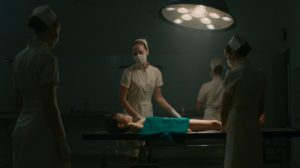 Review: Directress Film Festival
Review: Directress Film Festival
Evolution | Lucile Hadzihalilovic | France | 2016 | 81 minutes
WUD Film Directress Film Festival, Union South Marquee Theater, Saturday, March 11, 11:00pm»
Emily Caulfield explores Lucile Hadzihalilovic’s stunning Evolution, which screens this Saturday as part of WUD Film’s Directress Film Festival.
Editor’s Note: The WUD Film Directress Film Festival begins tonight and runs through Sunday, featuring great films like The Love Witch and Cameraperson. We will post reviews of Certain Women and Window Horses in the next two days, and you can read our review of Toni Erdmann here. Meanwhile, check out the entire schedule, as well as previews at The Capital Times and LakeFrontRow.
If we go to the movies to have an ecstatic experience, to be truly transported, than Lucile Hadzihalilovic’s sci-fi drama Evolution is one virtuosic bit of world-making. Do not miss this trip.
The staggering visuals alone make this feature a worthwhile endeavor. The earth-toned palette feels psychotropic. Filmed on the rocky coast of Spain’s Canary Islands, Evolution deals in blood reds and velvety greens, slate blues, rust and saffron. Remarkable textures transform each frame into an oil painting—bodily horror as told by Rembrandt or Degas, dark shapes and light providing brushstrokes on a rich and foreboding canvas.
The story explored in Evolution matches its style: not only is the narrative intriguing and instantly engaging, but it’s delivery is almost completely visual. We receive and process information as our young protagonist Nicholas (Max Brebant) does, with stoicism and open acceptance of some truly horrifying shit.
Nicolas and his mother (Julie-Marie Parmentier) live in a small hamlet of pale buildings dotting the coast, along with a group of women and their small boys. Our total immersion into this alien land is immediate, from the opening shots literally sucking us below the pounding seas to the suffocating interiors of their seaside home. Our view is tightly controlled and deftly guided, yet there is no hamfistedness here; Hadzihalilovic’s featherweight touch is invisible but everywhere. Lighting and framing and pops of color convey more than any dialogue could ever provide, revealing the plot to us in layers, casting great sheets off gruesome displays like some sort of unflinching magician.
Nicolas is told he’s sick, like all the other boys on the island. Their mothers enforce strict hours and rules, for bathing and swimming and eating their gruel and taking their medicine. The boys are submissive, dull, cold. Nicolas accepts his lot, until diving one day he sees a dead boy on the bottom of the ocean, a red starfish resting on his belly. Suddenly, he’s filled with questions.Who’s the dead boy with the horrible eyes? What’s wrong with me? Am I going to die?
Nicolas doesn’t outwardly question his surroundings but instead tries to maintain his independence by drawing in his sketch pad. He records the dead boy in there, the starfish. We peek into his past. He’s drawn a bicycle, a Christmas tree, a giraffe. Another clue, question to our surroundings: this forlorn coast is decidedly cheerless. Was he born here or spirited away to this place? From where did he learn such jollity?
Nicolas remains inquisitive, despite being taken back and forth to the hospital for mysterious treatments. He’s poked, prodded, sliced and stitched. The women perform ultrasounds on his tender belly. He and the other boys lay dimmed and sweaty in their cots, sharing bits of information like refugees.
Stella (Roxane Duran), a young nurse, befriends Nicholas. They say little to each other, but it is clear that she feels tenderness and perhaps sympathy for him. She is charmed by his drawings, and slowly becomes his advocate, a kind of protector. She has to assist during his surgeries, but she is on his side. We understand little by little, as he does, that she is caring for him.
The dreamlike sequence of events as we follow Nicolas on this journey through Evolution is so powerful, so immersive, so strange and emotional. The lack of exposition, paired with rich visuals, long takes, and atypical framing propel the viewer into a truly special place.
Hadzihalilovic was once Gaspar Noe’s editor, and her background shines through: the compositions are either arresting or just unnerving. Her decision to stay with a shot, forcing us to meet and reflect on it, often delivers startling but beautiful punches right to your solar plexus.
Evolution plays on old and well-trod territory in the most refreshing possible way: puberty as fresh hell, teen pregnancy, dystopia and bodily horror. It’s a story of the terror of something getting inside you, and there’s no greater authority on that kind of deep water than a woman. Hadzihalilovic sets that fear spinning and simply lets us go, free fall free dive. The film might ultimately be open to interpretation, but its payoff goes well beyond a story resolved.
Exposure to Evolution feels like an extraordinary gem, a wild find, possibly a transmission from an alternate place or time. It’s expansive and imaginative, horrible and tender, thrilling and gross. And just by watching we are transformed, like crabs, or starfish.